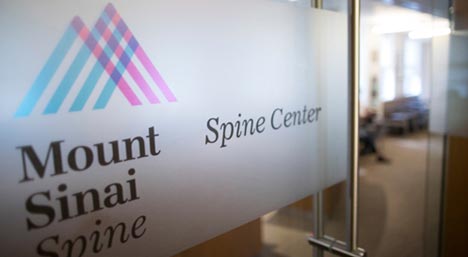Conditions We Treat
Dr. Bronson is experienced in treating complex spinal conditions including spinal trauma, tumors, stenosis, disc herniation, myelopathy, radiculopathy, scoliosis, sciatica, spondylolysis, sponsylolisthesis, kyphosis, and more.
Wesley H. Bronson, MD, MSB
Orthopedic Spine Surgeon
The Mount Sinai Hospital
5 East 98th Street, 4th Floor
New York, NY 10029
Phone: 212-241-5435
Fax: 646-537-9449
Mount Sinai Doctors - Scarsdale
341 Central Park Avenue
Scarsdale, NY 10583
Phone: 212-241-5435
Fax: 646-537-9449
Cervical myelopathy is a condition that often goes unrecognized by patients until they become very symptomatic because it can sometimes be very slow in onset and progress over years. The term “myelopathy” refers to dysfunction of the spinal cord (the main nerve bundle that travels from the brain and controls your arms and legs). The most common reason for this to occur is what spine surgeons call cervical spondylotic myelopathy (CSM), which refers to dysfunction of the spinal cord as a result of spinal cord compression (pressure on the spinal cord itself). Many patients often first present to their primary care physicians or a neurologist, unaware that the symptoms are from the neck / spine.
Patients with myelopathy often endorse some or all of the following symptoms:
Cervical myelopathy does tend to progress in most patients, with worsening symptoms over time. This is why it is important to get a thorough evaluation by Dr. Bronson to determine the best treatment options for you.
Dr. Bronson is an expert in the treatment of cervical myelopathy. Sometimes patients can be monitored over time or managed non-operatively with:
For patients requiring myelopathy surgery, Dr. Bronson is trained in many different modern techniques. These can include minimally invasive spine surgery and motion preserving cervical spine surgery in many cases. Some options include:
If you think you are experiencing symptoms of a cervical myelopathy, please call and make an appointment to see Dr. Bronson in the office for a complete evaluation.

Dr. Bronson is experienced in treating complex spinal conditions including spinal trauma, tumors, stenosis, disc herniation, myelopathy, radiculopathy, scoliosis, sciatica, spondylolysis, sponsylolisthesis, kyphosis, and more.

Dr. Bronson’s clinical focus comprises the full gamut of cervical, thoracic, and lumbar spinal conditions, ranging from outpatient minimally invasive procedures to complex adult spinal deformity and scoliosis surgery.

Mount Sinai Health System hospitals rank among the finest nationwide when it comes to excellence in delivery of patient care, and Mount Sinai Hospital is ranked worldwide in four specialties including orthopedics.